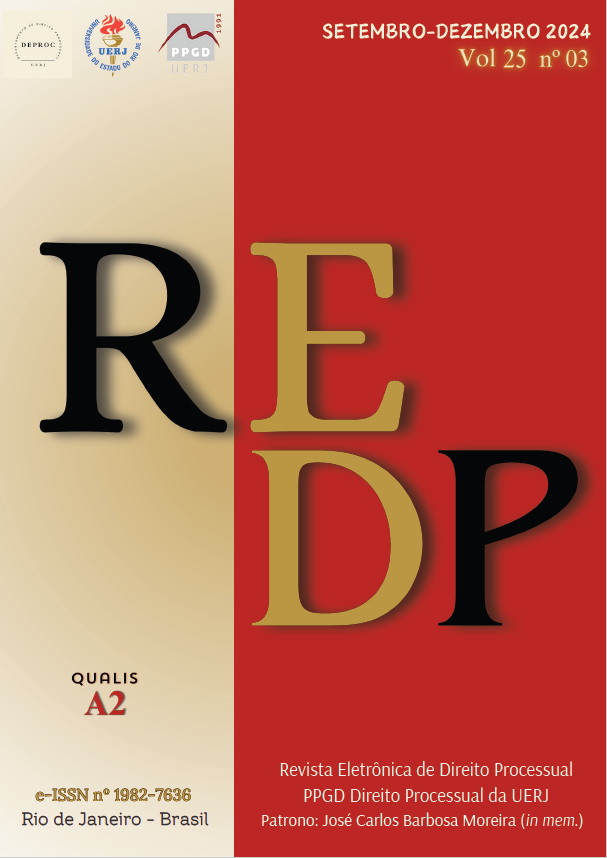A INFLUÊNCIA DA DESJUDICIALIZAÇÃO LUSITANA NO PL 6204/2019 E AS ALTERAÇÕES QUE TÊM SIDO FEITAS NO SEU PERCURSO
DOI:
https://doi.org/10.12957/redp.2024.86628Resumo
Um dos principais desafios do sistema justiça reside na concretização dos direitos já declarados em títulos executivos judiciais e extrajudiciais que não foram voluntária e tempestivamente cumpridos. Diante dos baixos índices de satisfação na seara executiva brasileira, inclusive publicizados pelo relatório Justiça em Números do CNJ, a realidade executiva exige atenção imediata. Dentre os esforços já realizados, destaca-se proposta de reforma legislativa, o PL 6204/2019, cuja finalidade é de desjudicializar a execução civil de quantia certa, atribuindo a um terceiro, o agente de execução, tarefas em prol da efetividade executiva, reservando o juízo competente tarefas de conteúdo decisório. A referida proposta possui declarada inspiração em reforma legislativa desjudicializante da execução civil portuguesa e ainda se encontra em tramitação no Senado Federal. Esta pesquisa tem por objetivo estudar a influência da desjudicialização lusitana no PL nº 6204/2019 e as alterações que têm sido feitas no percurso da proposta legislativa para execução brasileira de quantia certa que ainda apresenta contexto de alta morosidade e baixa efetividade. Utilizando-se a pesquisa bibliográfica como opção metodológica, parte-se do estudo da experiência da desjudicialização em Portugal, apresentando-se o contexto que antecedeu a desjudicialização lusitana e as reformas por que passou o instituto em Portugal. Examina-se ainda brevemente o procedimento pré-executivo na reforma lusitana de 2014. A seguir, passa-se ao estudo da influência da desjudicialização de Portugal no PL 6204/2019, analisando-se os institutos e as alterações que se têm processado no seu percurso legislativo. Ao final, conclui-se que, embora o PL nº 6204/2019 tenha sido influenciado pela experiência de desjudicialização de Portugal, as especificidades do nosso país e o caminhar do Projeto já começam a delinear características próprias e alguns pontos de distanciamento do modelo lusitano. Constata-se, enfim, que a desjudicialização em nosso país mostra-se uma salutar medida que abre uma porta a mais para a execução.
Downloads
Publicado
Como Citar
Edição
Seção
Licença
Copyright (c) 2024 Rosalina Moitta Pinto da Costa, Iracecilia Melsens Silva da Rocha

Este trabalho está licenciado sob uma licença Creative Commons Attribution 4.0 International License.
Todos os artigos publicados na Revista Eletrônica de Direito Processual (REDP) (Departamento de Direito Processual, Universidade do Estado do Rio de Janeiro, Brasil) são licenciados por meio de uma Licença Creative Commons - Atribuição 4.0 Internacional (CC BY 4.0).
Os autores retêm os direitos autorais de seu artigo e concordam em licenciar seu trabalho com a licença CC BY 4.0, aceitando assim os termos e condições específicos desta licença disponíveis no seguinte website: https://creativecommons.org/licenses/by/4.0/legalcode.
- Os autores concedem à REDP o direito de primeira publicação, de se identificar como publicadora original do trabalho e concedem à revista uma licença de direitos não exclusivos para utilizar o trabalho das seguintes formas: Reproduzir, vender e distribuir cópias eletrônicas ou impressas do manuscrito como um todo, de partes específicas do manuscrito e de suas traduções para qualquer idioma;
- O uso do artigo por terceiros é livre, contanto que a integridade da publicação seja mantida e seus autores originais, periódico de primeira publicação e detalhes de citação sejam identificados.
Dentro dos termos da licença, os autores podem entrar em acordos contratuais adicionais separados para a distribuição não exclusiva da versão publicada do trabalho na revista.
Copyright and Licensing
All articles published in the Procedural Law Electronic Review (REDP) (Department of Procedural Law, State University of Rio de Janeiro, Brazil) are licensed under a Creative Commons License - Attribution 4.0 International (CC BY 4.0).
- Authors retain copyright to their article and agree to license their work under the CC BY 4.0 license, thereby accepting the specific terms and conditions of this license available at the following website: https://creativecommons.org/licenses/by/4.0/ legal code.
- Authors grant REDP the right of first publication, to identify itself as the original publisher of the work, and grant the journal a non-exclusive license to use the work in the following ways: Reproduce, sell and distribute electronic or printed copies of the manuscript as a whole, of specific parts of the manuscript and its translations into any language;
- Use of the article by third parties is free, as long as the integrity of the publication is maintained and its original authors, first publication journal, and citation details are identified.
Within the terms of the license, authors may enter into separate additional contractual agreements for the non-exclusive distribution of the published version of the work in the journal.




